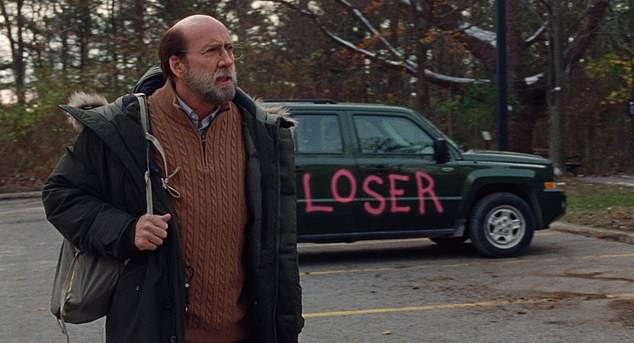Nicolas Cage considers Dream Scenario to be a ‘masterpiece’.
That’s pushing it some, and it should also be noted that as leading man and co-producer, his is not exactly an objective view.
The film is, however, an arrestingly original and thought-provoking satire about the discomforts and perils of instant, unsought fame.
It is also very funny in parts, before it gets so dark that you wonder whether the writer-director, Kristoffer Borgli, had to be quite so merciless towards his lead character.
In unfamiliar nondescript guise — balding, bearded, a little overweight — Cage plays mild-mannered professor of evolutionary biology Paul Matthews.

Nicolas Cage (pictured) plays mild-mannered professor of evolutionary biology Paul Matthews.

Cage’s character begins to appear in people’s dreams, whether they know him or not
Paul is contentedly married with two daughters and a tenured job at an obscure college, so life has not treated him badly.
But when he explains to his students that a zebra’s stripes are intended to suppress its individuality by making it blend in with the herd as a protection against predators, he might as well be talking about himself.
Paul leads a blameless, boring life as inconspicuously as he can.
The most radical thing he has ever done is adopt the surname of his wife Janet (Julianne Nicholson), but even that was about not asserting himself.
Indeed, he is too dull even to be invited to the frequent dinner parties thrown by a neighbour, an old college acquaintance.
But then something unprecedentedly strange starts happening to him — he begins to appear in people’s dreams, whether they know him or not.
Soon, he acquires national and then global celebrity, but typically wants to exploit his bizarre new-found fame in the most modest way, by using it to publish the academic book that, just as typically, he has never got round to writing.

‘As an observation of how fame works, Dream Scenario is as clever in its way as Peter Weir’s 1998 hit The Truman Show, which really was a masterpiece’, writes Brian Viner

Paul’s celebrity begins to sour when his alter ego in people’s dreams turns violent, even murderous
Others, though, see dollar signs. The slimy head of a big-city marketing agency, played by Michael Cera, wants Paul to become the face of Sprite, on the back of his extraordinary new status as a dream influencer and consequently ‘the most interesting person in the world’.
Moreover, the meeting at the agency leads to another unexpected development: a young woman there confesses to Paul that in her dreams she has very exciting sex with him.
In the film’s funniest scene, he accompanies her to her apartment, persuaded against his better instincts to oblige her by bringing her steamy nocturnal fantasies to life.
What unfolds is hilarious, laugh-out-loud stuff, yet in some respects also pathetic, preparing the ground for what happens next.
Paul’s celebrity begins to sour when his alter ego in people’s dreams turns violent, even murderous.
After being a person everyone wants to meet, he literally becomes everybody’s worst nightmare. He’s still the same unassuming, hapless guy, but the perception of him has changed.
As an observation of how fame works, Dream Scenario is as clever in its way as Peter Weir’s 1998 hit The Truman Show, which really was a masterpiece.
This film loses its way a little in the final act, as Borgli’s ideas about commercialising the subconscious begin to crowd his own narrative.
Nevertheless, the Norwegian director of last year’s darkly satirical Sick Of Myself has made a dream of an English-language debut, and his counter-intuitive casting of one of Hollywood’s most singular actors as a bland everyman is a triumph.
Incidentally, another of the co-producers alongside Cage is Ari Aster, and there are distinct echoes in Dream Scenario of Aster’s most recent film, the surreal tragi-comedy Beau Is Afraid.
But I found this film much more watchable, not to mention an hour shorter.






















